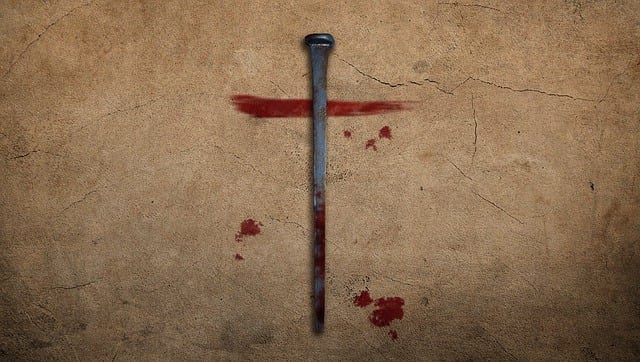There Is Power In The Blood
I keep running into Christians who tell me they believe they can lose their salvation. I scratch my head at this belief. Many times, I will ask them this, “Suppose a saved man is driving down the street. On the sidewalk, he sees a beautiful woman. His eyes stray, and while looking at the woman, he runs a red light and dies in the accident he caused. Does he go to hell instead of heaven?”
The usual answer is, “Well, no. One little thing like that wouldn’t be enough to lose your salvation.”
Where is the line? Everyone sins after salvation. At what point do people lose their eternal life? One sin? A hundred? A thousand? Or is it particular sins that cause God to remove His grace? Murder? Rape?
How can anyone lose anything eternal? Twenty-eight verses in the New Testament use the words “eternal life.” Two verses use the phrase “life eternal.” Fifteen verses use the term “everlasting life,” and two use the words “life everlasting.” All in all, forty-seven verses use the words eternal or everlasting to describe salvation.
Four times, in speaking of our salvation, the New Testament explains that Christians are “sealed” by God (John 6:27, 2 Corinthians 1:22, Ephesians 1:13, Ephesians 4:30).
He does not use the word “sealed,” but Jesus uses different verbiage to explain the same thought. John 10:28-29, “And I give unto them eternal life; and they shall never perish, neither shall any man pluck them out of my hand. My Father, which gave them me, is greater than all; and no man is able to pluck them out of my Father’s hand.”
Jesus is so adamant about salvation being eternal that He repeats the inability of anyone to remove us from Him or God the Father. Those who believe the loss of salvation is possible will tell me that I can take myself out of God’s hands. Well, Jesus says, “no man,” and that would include the individual Christian. After all, we are still part of mankind.
The prodigal son is another example of eternal security. The prodigal left home, engaged in all kinds of activity his father would consider evil, and he wasted everything his father gave him. Some will say the prodigal got his salvation back when he returned home. I will contend that he always retained it.
At no time does the father announce that the prodigal son is no longer a son, banished from the family. Regardless of how far the prodigal went into sin and despair, he was just as much a son as the brother who remained home.
While away, his relationship with his father was nonexistent, but he was still a child of the father. “…And if a son, then an heir of God through Christ” (Galatians 4:7).
Hebrews 7:25 explains that Jesus saves to the uttermost. “Wherefore he is able also to save them to the uttermost that come unto God by him, seeing he ever liveth to make intercession for them.”
Jesus is sitting on the right hand of the Father. What do you think He does there? As Hebrews 7:25 says, He is making intercession for us. 1 John 2:1 uses the word “advocate” in describing Jesus’ actions on the throne. When the saved sin, Christ intercedes on our behalf; He is our advocate. As the Father and Jesus see a child of God sin, Jesus leans over and says something to the effect, “Daddy, my blood already paid for that.”
Isaiah 53 is the Old Testament’s most vivid prophecy of the cross. When you have the opportunity, please take a minute to read it. The entire chapter describes in detail the agony of the cross. Verses 4-6 also explain why Jesus died on Calvary. “Surely he hath borne our griefs, and carried our sorrows: yet we did esteem him stricken, smitten of God, and afflicted. But he was wounded for our transgressions, he was bruised for our iniquities: the chastisement of our peace was upon him; and with his stripes we are healed. All we like sheep have gone astray; we have turned every one to his own way; and the LORD hath laid on him the iniquity of us all.”
Jesus Christ died as the sacrifice for our sins. That is why the Bible calls Him the “Lamb of God.” He was the Sacrificial Lamb for humankind.
If you believe you can lose your salvation, ask yourself this question – At what point is the blood of Christ no longer good enough?
Three times, Jesus is called the propitiation for our sins (Romans 3:25, 1 John 2:2, 1 John 4:10). A propitiation is a gift given to appease someone else, to make someone happy, to make all things good.
The blood of Jesus Christ is the sacrifice made and the gift given to the Father to make all things good between God and us sinners.
Returning to Isaiah 53, verse ten says, “Yet it pleased the LORD to bruise him…” The sacrifice of Christ is the appeasement, the propitiation between us and God the Father. When God sees the blood of Jesus, He is satisfied.
If a person could lose their salvation, the Father must become dissatisfied with His Son’s sacrifice. That will never happen. That is why the terms used for salvation are eternal and everlasting.
The blood saves us, and the blood keeps us saved.
I will end with a request. If you still believe you can lose your salvation, please never sing the hymn, “There is Power In The Blood.” By thinking you can lose your salvation, you have transferred the power from the blood to yourselves. Singing the hymn is, therefore, hypocritical.

Preacher Tim Johnson is Pastor of Countryside Baptist Church in Parke County, Indiana. His weekly column “Preacher’s Point” may be found at: www.preacherspoint.wordpress.com

